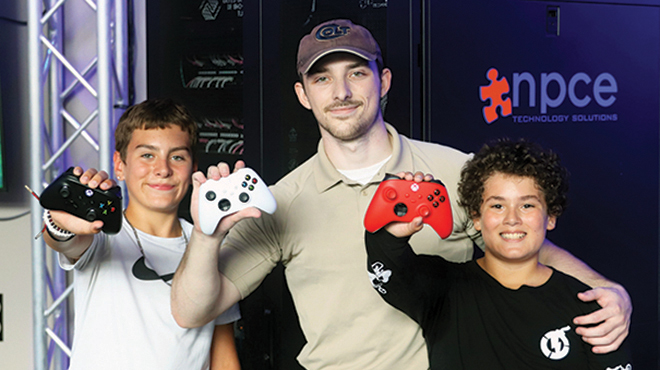
By Micheal Rios, Tulalip News
The video game landscape has undergone quite the evolution. From an overly dramatic, but somehow not that farfetched, idea that video games will rot a kid’s brain, to the culture-shifting news reported in July that e-Sports are set to take the Olympic stage in 2025. Yes, you read that right – video games are going to be an Olympic sport.
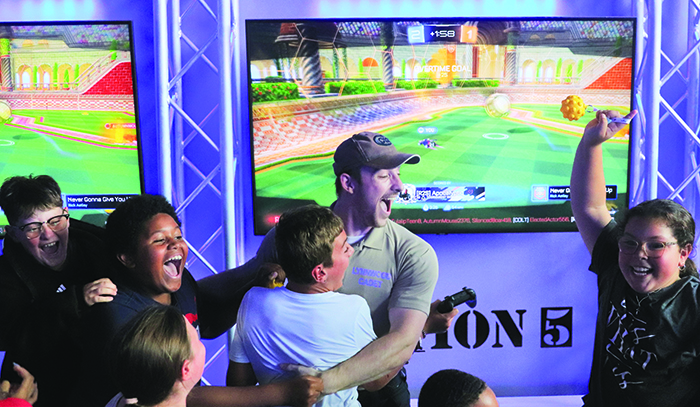
An official International Olympic Committee press release from July 12 reads, “A ‘first’ ever Esports Olympic Games are committed to a special event that respects and celebrates the Olympic values while boldly seizing the momentum to drive esports forward with the international platform the sport and its athletes deserve. The world will have an open invitation to join us in 2025 and celebrate this moment together.”
It’s easy to imagine a slew of parents shaking their heads in disbelief and thinking, “Yeah, well, video games can still rot a child’s brain. Olympic sport or not.” The thing is that’s simply not true. In fact, as reported by MedPage Today, a cross-sectional study found kids who played video games showed better cognitive performance than non-gamers. Specifically, those who played video games performed better on response inhibition tasks and working memory versus those who never played.
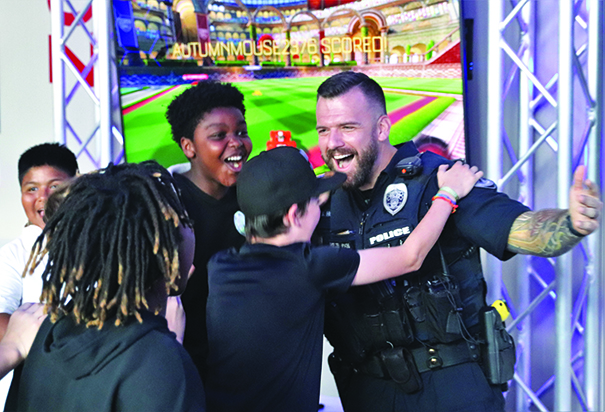
“Many parents today are concerned about the effects of video games on their children’s health and development,” said Bader Chaarani, Ph.D, a research professor at the University of Vermont. “And as these games continue to proliferate among young people, it is crucial that we better understand the positive impact that such games may have.”
One such positive impact is community building. For those in the know, video games have long since transcended their status as mere entertainment. They’ve become a significant social platform for kids and adults, alike.
In the digital era, people are more connected than ever before, and video games play a crucial role in this connectivity. A prime example of this connectivity and community building playing out in real time with real people was at the 2nd Annual e-Gaming Tournament. Hosted at our local Club, thirty-two teams representing all twelve Boys & Girls Clubs of Snohomish County and twelve local law enforcement agencies teamed up for an epic day of e-gaming.
Teams of three (two club kids and one law enforcement representative) battled it out during a competitive four-hour tournament. Their game of choice? The excitement fueled, arcade-style soccer game, Rocket League.
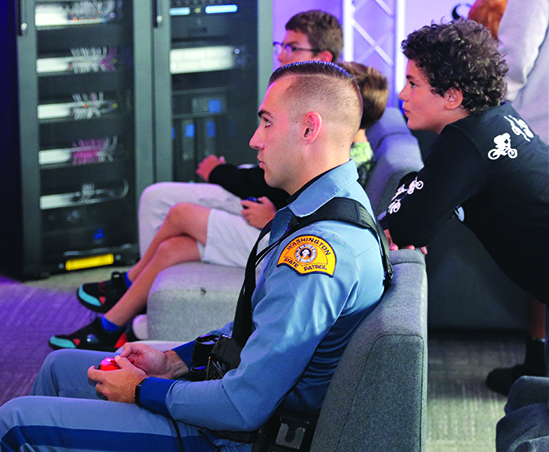
Competitors filled the Club’s teen center that’s become well-known for its plethora of gamer tech; an impressive internet bandwidth able to support supersized TVs, the latest Xbox gaming systems, high-end desktops with overclocked CPUs and graphics cards the size of small novels. Two of those TVs were dedicated to displaying an updated tournament bracket.
What started with 32 teams was whittled down round by round, through heartbreaking losses and literal jump for joy wins, until only two teams remained for an ultimate showdown. Teams that were eliminated early became spectators eager to see who would be crowned champion.
Prior to competing for the Championship, 22-year-old Lynnwood police cadet Cade Moren reflected on the day’s legendary potential. “The most exciting aspect of this tournament is it really shows how much video games can cultivate such a positive experience with law enforcement. Events like these really shows that collaborating with local police departments is such a worth while investment. How many seeds are being planted here that will grown into fantastic relationships in the future? Relationships that can only improve our shared communities and possibly have life altering benefits; such as kids who may go on to pursue a career in law enforcement because of this experience, or a cop who views a community differently because of a super cool interaction they had playing a video game with kid who reminded them of their younger self.”
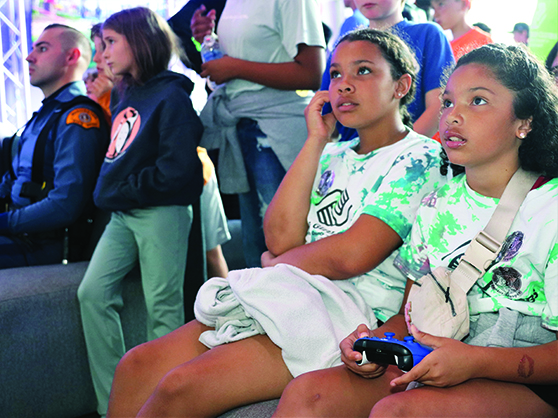
Expanding on what police cadet Cade so eloquently stated, video games are well-known conduits that attract players with shared interests. This creates a natural foundation for friendship. Kids and teenagers who might struggle with social interactions in every day, real life may find it easier to connect with others in a digital, online environment, where the focus is on a shared activity. For example, Tulalip youth living on their reservation may find support in gaming communities where they can express themselves more freely and connect with others who share similar experiences.
Twenty-six-year-old Jordan Jira isn’t too far removed from being that kind of Tulalip youth himself. Now, a Tulalip police officer, he still remembers that sense of community that came from unified purpose and simple fun. “I think this has been such an amazing experience for us officers and the kids. It’s something we can all come together, have fun in its purest form, and just make cool memories. The energy and excitement here in this building is kind of unmatched. It reminds me of high school sports and how fun it was to cheer on your favorite team or players. Like it should’ve been back then, it doesn’t really matter who wins or loses, all that matters is having fun.”
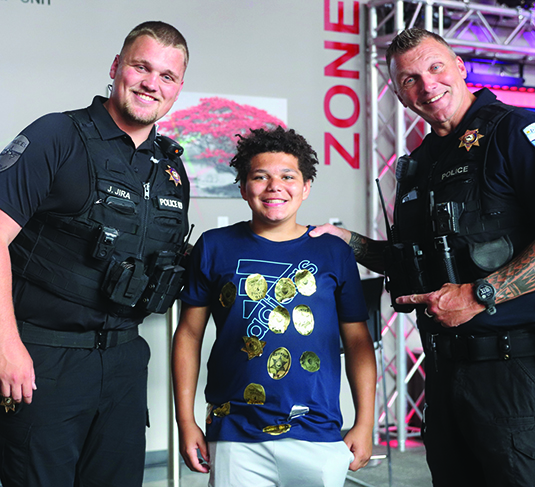
Jordan can also attest to just how far video game culture has evolved over such a short period of time. He admitted it feels like only yesterday his dad, TPD Sergeant Jeff Jira, wasn’t all that thrilled with video games, but now his dad actively cheered him on from as he navigating the digital realm all the way into the semi-finals. “He’s always been a real supportive father, so now its good to know he’s even supportive of video games, too. This is good practice for him because he’s going to be a grandfather again soon. Maybe this upcoming grandbaby has an Olympic gold medal in his future thanks to video games. Never know.”
Vying for a Rocket League championship, not a gold medal, ultimately came down to Team Everett vs Team Alderwood. Many oohs and ahs were generated by the crowd of spectators as they were treated to a highly contested match that went into sudden death overtime. Team Everett scored in the first minute of overtime and were crowned champions.
The winning team was comprised of City of Everett police officer Brandon Hoelzel, 14-year-old Aweys Hussein (Somalian) and 12-year-old Hamadi Rashid (Kenyan).
“My heart was pumping so hard every match. I was so nervous because it was my first time ever playing this game and didn’t want to let my team down. Now, that we’ve won it all, I’ll definitely be bragging about this for a while,” admitted Hamadi.
Scoring the championship-winning goal was officer Brandon. He said that not having known either of his younger teammates before it felt like he was playing with his younger brothers. “I enjoy playing video games in my free time. Usually I’m the one being humbled by my younger brothers, so it felt pretty good being the one to carry the team this time,” he joked. “Seriously though, it was a total team effort. After every goal and win, we’d celebrate with a high-five or fist bump. I definitely fed off their excitement.”
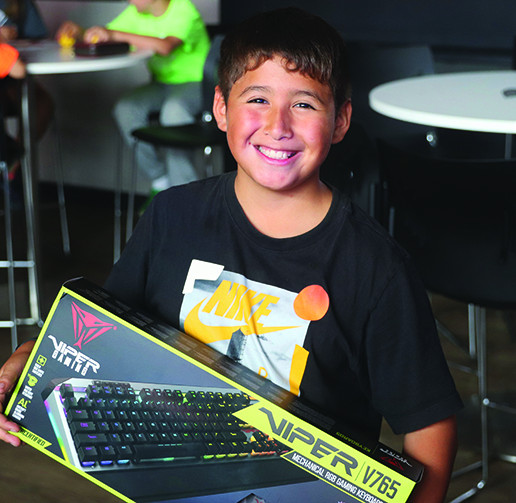
The collaborative nature of video games, such as Rocket League, brought together a super diverse field of competitors together. Kids and cops from different cities, neighborhoods, and ethnic backgrounds learned to communicate effectively, resolve conflicts, and work together to achieve their objectives. Interactions like these, as witnessed over and over again during the tournament, greatly promote a sense of empathy and understanding for others, especially as it relates to youth and the law enforcement officers sworn to protect them. Let us revel in the hope that beyond the thrill of gameplay, true community building took place in a safe space forged by video games.